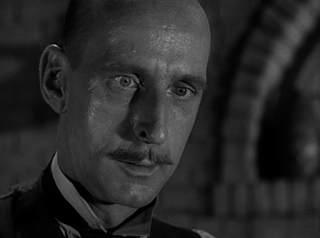
In the first five seasons of Alfred Hitchcock Presents, Victor Wolfson (1909-1990) wrote or co-wrote the teleplays for six episodes, always adapting works by other writers. Said to have begun his "professional career organizing acting clubs for striking coal miners in West Virginia," Wolfson's Broadway credits began in 1926, when he acted in a play called Mixed Bill. By 1935, he was writing plays produced on Broadway, and by 1943 he had begun to write short fiction pieces for magazines such as The New Yorker.
He began writing for television in 1951 and his credits include 14 episodes of Suspense and at least five episodes of Janet Dean, Registered Nurse, the series produced by Joan Harrison not long before the premiere of Alfred Hitchcock Presents. When the Hitchcock show started, Wolfson may have been assigned scripts by Harrison once again, since he wrote two teleplays for the first season.
 |
| Victor Wolfson |
After his work for Alfred Hitchcock Presents, Victor Wolfson won an Emmy for writing the first episode of a documentary series called Winston Churchill: The Valiant Years in 1960. He wrote the screenplay for a documentary film in 1966 and then appears to have retired.
* * * * *
Victor Wolfson's first teleplay for Alfred Hitchcock Presents was "The Perfect Murder," a superb adaptation of a classic crime story by the French writer Stacey Aumonier that was first published in the October 1926 issue of The Strand Magazine.
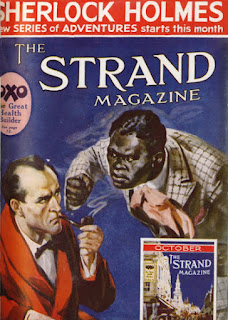 |
"The Perfect Murder"
first appeared here |
In a Parisian cafe one November evening, two brothers, Paul and Henri Denoyel, discuss murder. Both men are always in need of money and their only other relatives are an aunt and uncle named Taillandier, who are "fairly well off." Uncle Robert dies the following February and, when his will is read, the brothers learn that he left a sum in trust for his wife; when she dies, "a portion of the interest was to be divided between Henri and Paul..." Aunt Rosalie is 82 and frail. The brothers attempt to borrow money from their aunt, with little success.
After two years, they begin to despair that she will not die soon. Another year passes and, when Paul faints while once again trying to borrow money, Aunt Rosalie insists that he move into her villa. Over time, the older woman grows attached to her nephew and Henri becomes jealous. Eventually, though, Paul's dissolute behavior puts him in such desperate straits that he appeals to his brother for a loan. On a rainy November evening, the brothers sit in a cafe and Henri suddenly recalls their conversation about murder years ago. Henri suggests that Paul murder his aunt.
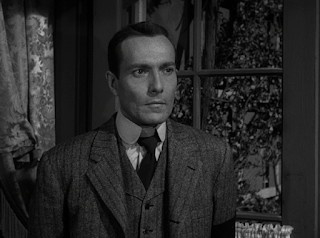 |
| Hurd Hatfield as Paul |
Paul soon devises a plan: his aunt eats a souffle made with two eggs every other night and the maid always beats the eggs and leaves them in a basin after lunch. Paul asks Henri to "'grind up a piece of glass'" to sprinkle in the basin. The next day, the deed is done, and Henri spends the rest of the day agonizing over the murder that he believes is about to take place. The following morning, he rises late and buys a newspaper, which features the story of Paul Denoyel, who died in "great agony" after eating an omelet. Henri later learns that Aunt Rosalie had insisted that it was not the day for eggs and so, not wanting to waste food, the maid later prepared an omelet for Paul.
In her introduction to The Third Omnibus of Crime, a 1935 collection where this story was reprinted, Dorothy L. Sayers writes that "In the selection of stories for the first part of this volume, ingenuity in discovering new tricks has been allowed to count equally with literary merit; the two do not always go together. When they do, as in... Stacy Aumonier's The Perfect Murder, the reader's satisfaction is, naturally, all the greater."
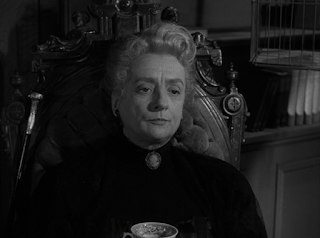 |
| Mildred Natwick as Aunt Rosalie |
Aumonier's story is delightful and it was a perfect choice for adaptation to Alfred Hitchcock Presents. Victor Wolfson's teleplay follows the story closely and demonstrates his skill at turning narrative into dialogue. He deletes the story's opening scene where the brothers discuss murder as an abstract concept and the TV show opens with the reading of the will. There is on and off voiceover narration by Henri, who introduces the main characters right away, and the events of the TV show are compressed in time, occurring more rapidly than those in the story, where they play out over several years.
The mix of humor and horror in "The Perfect Murder" makes it quintessential Hitchcock; the dialogue between Rosalie and Paul is playful and his faint is theatrical; Rosalie seems to realize that her handsome nephew is not always on the level, but she is charmed and flattered by his attentions and happy to have a younger man around the house. Later events are foreshadowed when Paul has a conversation with the maid in the kitchen and there is an excellent scene in which Rosalie and Paul speak the truth about each other, seemingly in jest. Paul holds Rosalie by the hands and nearly lets her fall backward before steadying her--she laughs but there is uncertainty and fear in her eyes.
 |
| Philip Coolidge as Henri |
One night, Paul catches Henri stealing a silver picture frame from Rosalie's house to pawn for money; it is then that Paul first suggests killing his aunt. The brothers walk outside, where Paul plucks a flower and says: "'It's withered. I despise decaying things.'" The inference is that the honeysuckle blossom represents his aunt. The brothers are opposites: Paul is young, handsome, single, and confident, while Henri is older, plain, married, and uncertain. A closeup of Henri grinding up a wine glass with a mortar and pestle is horrible since the viewer knows the plan for its use. When Henri hands Paul the vial of ground glass, Paul remarks: "'It will be an ambrosia, fit for the angels, and when Aunt Rosalie tastes it, she'll become one of them.'"
 |
| Gladys Hurlbut as Ernestine |
At lunch, before Paul puts the glass in the eggs, he gets his aunt tipsy with wine and tells her that dinner will be a surprise: "'souffle a la glace,'" he calls it. This is a clever bit of wordplay for English-speaking viewers that makes no sense in French and is absent in Aumonier's short story. The phrase "a la glace" means "with ice cream," which is nonsense when referring to a souffle. However, the viewer, aware that Paul plans to put ground glass in Aunt Rosalie's souffle, understands the double meaning of the homophones "glace" and "glass." The black humor in Wolfson's script is delicious!
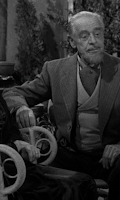 |
Walter Kingsford as
Dr. Poncet |
Paul openly flirts with Rosalie not long before he tries to kill her, calling her "'my love,'" a term of endearment that she pretends to bristle at but that clearly pleases her. There is then another horrible closeup of Paul sprinkling the ground glass in the eggs and mixing it in. The next morning, Henri narrates once again as he waits for news. Instead of reading about Paul's death in the paper, he learns what happened in a telephone call, but the surprise is held back from the viewer, who cannot hear what Henri hears. At Rosalie's house, Ernestine, the maid, explains what happened. The camera focuses on her, then on Henri, and finally pans over to show Rosalie, alive and well. Rosalie tells Henri of Paul's death and of his last words, which were "'omelet a la glace,'" which she calls "'a joke we had.'" Rosalie suggests that Henri have something to eat, "'an omelet, perhaps?'" and he leaps up and rushes out of the room, ending the episode.
 |
| Percy Helton as the lawyer |
"The Perfect Murder" is an exemplary short film that follows its source story closely while adding small touches that make it even more entertaining. The show moves quickly from start to finish and benefits from strong performances and brisk direction.
Stacy Aumonier (1877-1928), who wrote the short story upon which the TV show was based, was a British writer best known for his short stories. He served in World War One and died at a fairly young age of tuberculosis; he was praised by such contemporary writers as John Galsworthy, James Hilton, and Rebecca West. IMDb lists a handful of films and TV shows adapted from his stories, including two other episodes of
Alfred Hitchcock Presents, one of which was
"Little White Frock."
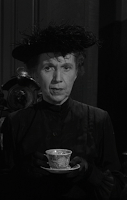 |
| Hope Summers as Marie |
"The Perfect Murder" was directed by Robert Stevens (1920-1989), who worked in television from 1948 to 1987 and directed 44 episodes of
Alfred Hitchcock Presents and five episodes of
The Alfred Hitchcock Hour. He won an Emmy for
"The Glass Eye." He also directed 105 episodes of
Suspense in the early 1950s.
Top billing goes to Hurd Hatfield (1917-1998) as Paul. Born William Rukard Hurd Hatfield in New York City, he moved to London after college and began appearing on stage. He returned to the U.S. and was seen on Broadway from 1941 to 1958, but his film and TV career lasted longer, from 1944 to 1991. Best known for his starring role in
The Picture of Dorian Gray (1945), Hatfield also appeared in one other episode of
Alfred Hitchcock Presents, "None Are So Blind."
 |
| Jack Chefe as the waiter |
Mildred Natwick (1905-1994) plays Aunt Rosalie with her usual mix of intelligence and acerbic wit. On Broadway from 1932 to 1979 and on screen from 1940 to 1988, she appeared in Hitchcock's
The Trouble with Harry and won an Emmy in 1974 for a series of TV movies about "The Snoop Sisters," where she played one of the title crime solvers. Natwick also starred in one other episode of
Alfred Hitchcock Presents, "Miss Bracegirdle Does Her Duty," which was also adapted from a story by Stacy Aumonier.
Philip Coolidge (1908-1967) is perfect as the timid, uncertain brother, Henri; a radio announcer turned stage actor, he was on screen from 1947 to 1968, appeared in Hitchcock's
North By Northwest (1959), and was seen in seven episodes of the Hitchcock TV series, including
"Whodunit." He was also on
The Twilight Zone.
In smaller roles:
- Gladys Hurlbut (1898-1988) as Ernestine, the maid; she worked on Broadway from 1920 to 1949 as both actor and playwright before starting a screen career that lasted from 1951 to 1961. She was in one other episode of Alfred Hitchcock Presents.
- Walter Kingsford (1882-1958) as Dr. Poncet; born Walter Pearce in England, he appeared on the London stage and then on Broadway from 1912 to 1946. His screen career lasted from 1922 to 1958 and he was in five episodes of Alfred Hitchcock Presents, including "John Brown's Body."
- Percy Helton (1894-1971) as the lawyer who reads the will; he was in vaudeville from age two and served in the Army in World War One. He damaged his voice permanently while yelling in a stage play and thus had a distinctively squeaky way of talking for much of his career. He was on screen from 1915 to 1978 and appeared in seven episodes of Alfred Hitchcock Presents, including "The Creeper"; he was also in the classic episode of Bus Stop, "I Kiss Your Shadow," as well as on The Twilight Zone and Batman.
- Hope Summers (1902-1979) as Marie, Henri's wife; on screen from 1950 to 1987, she appeared in one other episode of Alfred Hitchcock Presents, "The End of Indian Summer," had recurring roles on The Rifleman and The Andy Griffith Show, played one of the Satanists in Rosemary's Baby (1968), and appeared on Night Gallery.
- Jack Chefe (1894-1975) as the waiter; born in Russia, he played hundreds of bit parts in a screen career that lasted from 1928 to 1963; he also appears in two other episodes of Alfred Hitchcock Presents, including "Specialty of the House," co-written by Victor Wolfson.
"The Perfect Murder" first aired on CBS on Sunday, March 11, 1956. Read the short story online
here; buy the DVD
here; or watch it online
here.
Sources:
Aumonier, Stacy. "The Perfect Murder." The Third Omnibus of Crime, edited by Dorothy L. Sayers. Blue Ribbon Books, 1935.
The FICTIONMAGS Index, http://www.philsp.com/homeville/FMI/0start.htm.
Galactic Central, http://philsp.com/.
Grams, Martin, and Patrik Wikstrom. The Alfred Hitchcock Presents Companion. OTR Pub., 2001.
IBDB, IBDB.com, https://www.ibdb.com/.
IMDb, IMDb.com, https://www.imdb.com/.
Lane, Christina. Phantom Lady: Hollywood Producer Joan Harrison, the Forgotten Woman behind Hitchcock. Chicago Review Press, 2021.
Norris, J F. "Moonlighters: Victor Wolfson - a Playwright Dabbles in Gothic Dread." MOONLIGHTERS: Victor Wolfson - A Playwright Dabbles in Gothic Dread, 25 June 2021, https://prettysinister.blogspot.com/2021/06/moonlighters-victor-wolfson-playwright.html.
"The Perfect Murder." Alfred Hitchcock Presents, season 1, episode 24, CBS, 11 Mar. 1956.
Sayers, Dorothy L. "Introduction." The Third Omnibus of Crime, p. 3.
Wikipedia, https://www.wikipedia.org/.
In two weeks: Our coverage of Victor Wolfson continues with "Malice Domestic," starring Ralph Meeker and Phyllis Thaxter!
Listen to Al Sjoerdsma discuss "The Perfect Murder" here!
Listen to Annie and Kathryn discuss "The Legacy" here!










2 comments:
It's partly a spoiler, but Phil Coolidge is great as another timid murderer in THE TINGLER with Vincent Price.
No worries. I saw it so long ago it's all new to me by now!
Post a Comment